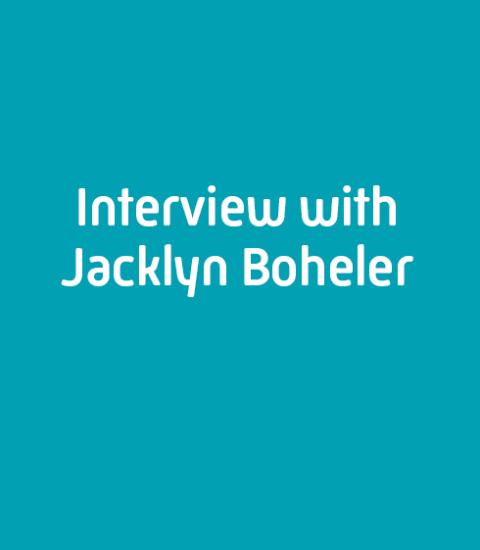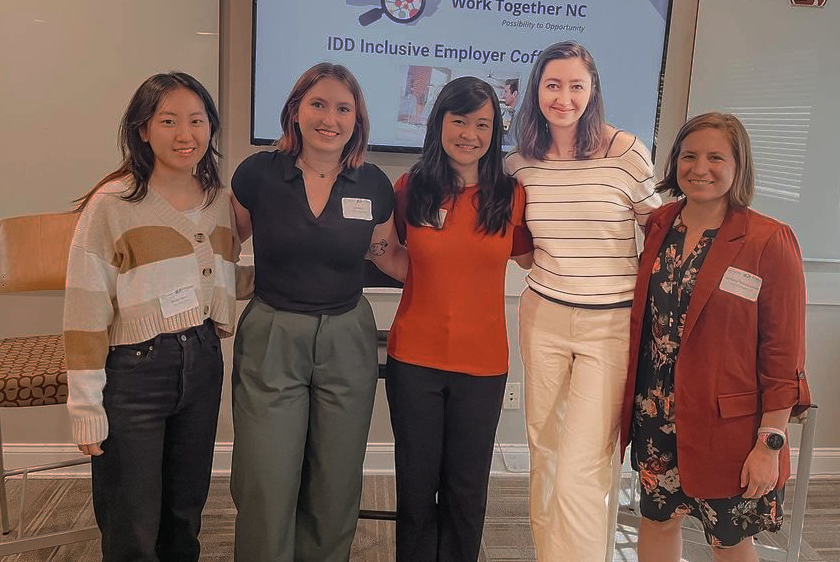

Jacklyn Boheler, second from the right
Written by Tomeico Faison
Dr. Tomeico Faison is a graduate of BU’s OTD program and completed a capstone project in social entrepreneurship education. She is the CEO and consultant of community-based businesses in NC (faisonconsulting.com), a faculty member at Duke University and capstone mentor at BU.
E-mail: tomeico@tsofnc.com
Tell us about how your business and how you got started in social entrepreneurship?
B3 Coffee is a nonprofit that provides social and vocational opportunities for people of all abilities. Using the way coffee brings people together, B3 aims to facilitate community between people with and without disabilities and ultimately advance disability justice, allyship, and inclusion. B3 adheres to a "no-hierarchy" model between people with and without disabilities, meaning that disabled people hold leadership roles at all levels of the organization and everyone involved is considered a "B3 member." B3 stands for Being, Belonging, and Becoming better together.
B3's impact is enacted through a 4-prong organizational model. (1) B3 operates a transitional employment model at the Chapel Hill Public Library and connects their paid interns with long-term employment in the community. B3 consults with employers to reduce stigma and dismantle misconceptions around hiring people with intellectual and developmental disabilities. (2) B3 offers a flourishing social community, including people of all abilities, which meets multiple times throughout the week. To increase accessibility (i.e., transportation and geographical barriers), B3 also offers a weekly virtual social in addition to their in-person offerings. (3) B3 offers a "pop up" coffee service for special events (i.e., conferences, teacher appreciation days), which has allowed us to provide abundant opportunities for community engagement/visibility for our members. (4) B3 offers programming that supports the transition to adulthood and lifelong learning, including a work readiness class, assistive technology class, and life skills class.
How does your business contribute to the prevention of illness, injury and disability for underserved populations?
B3 aligns with a social model of disability and neurodiversity paradigm, so we do not aim to prevent disability. Rather, we aim to create a community culture that values disabled people for their inherent worth and dignity. We believe that positive visibility is the first step toward breaking down structural barriers, so B3's offerings are intentionally designed to facilitate engagement across populations that might not otherwise interact. Our kiosk's location at the Chapel Hill Public Library has been ideal, as it has exposed the public to disabled "ways of being" in one of the most central community spaces. Through cultivating our "space of belonging" at the library and other public spaces, we are normalizing disabled participation in all facets of the local social and economic infrastructure.
What factors have contributed to the financial sustainability of your business?
B3 has successfully obtained a variety of private foundation grants to sustain and scale our programming. We have also registered as a vendor with our local Managed Care Organization so that individuals receiving the Medicaid Innovations Waiver can receive funding to cover our program fees. B3 is also supported by our revenue streams including our kiosk and pop up/catering services. Finally, as a nonprofit, B3 is supported by a generous community of private donors.
How has the financial success of your business allowed you to have a social impact in your community?
Our multi-pronged model has provided us with a strong foundation for financial success– if one aspect of the model of not breaking even, we are able to scale back or make changes and focus on bolstering another stream of revenue. In addition, our nonprofit status has allowed us to fundraise, obtain grants, and scale the organization to further advance our mission.
What advice would you give others who want to become social entrepreneurs?
You don't have to know everything. Truthfully, you will never be fully prepared. You will learn as you go! Just be sure to find mentorship and outsource in the areas you lack expertise (for me, that was legal, financial, and business planning assistance).
